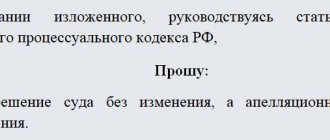Home / Complaints, courts, consumer rights / Litigation
Back
Published: 08/31/2018
Reading time: 6 min
0
265
In the practice of civil proceedings, there are often situations in which one of the parties to the trial does not agree with the outcome of the process. To resolve such cases, the law provides for the possibility of filing an appeal.
- Appeal in civil proceedings
- Preliminary complaint
- Drawing up a complaint
- Filing a complaint
- Acceptance, review and possibility of refusal
- Possibility of refusal of appeal
Based on the results of the appeal, a controversial court decision can be changed or canceled: depending on the requirements of the party to the proceedings who disagree with it and in accordance with legislative norms.
From whom complaints are accepted?
According to the Civil Procedure Code, CAS, Code of Criminal Procedure and Arbitration Procedure Code of the Russian Federation, all interested persons and parties can apply to the courts:
- citizens;
- prosecutor;
- government departments;
- local government;
- various organizations and other bodies.
For military personnel, a separate procedure for protecting rights is provided, which involves filing a complaint specifically in a military court.
If the case is considered through writ proceedings, objections to the order are accepted from the defendant.
A complaint can be filed with the court not only by an individual, but also by his representative. To consider a complaint, the court first determines the eligibility of the applicant. If the person who applied is not related to the case, the judge may refuse to consider the complaint.
Principles of operation of the district court in 2019
A list of basic principles for the activities of courts of general jurisdiction in the Russian Federation can be found in Art. 5 of the Federal Law “On Courts of General Jurisdiction in the Russian Federation”:
- Justice can only be administered by the court ;
- Any interested person has the right to appeal to the district court ;
- The consideration of cases in the district court is carried out on the basis of adversarialism and equality of the parties ;
- Everyone is equal before the court - regardless of gender, race, nationality, language, attitude to religion, etc .;
- By default, all district court hearings are open to the public ;
- Most cases in district courts are heard in person ;
- Judicial acts of district courts that have entered into force are subject to strict execution throughout the Russian Federation .
Actions and inactions that violate your rights
A complaint is filed in court as a result of a violation of the rights of citizens or parties to the process. To avoid refusals of consideration, it is necessary to adhere to the established hierarchy:
- The actions of the investigator should initially be complained to the investigative committee or the prosecutor's office.
- For inaction of the prosecutor's office - to the immediate superior of the specialist who violated your rights.
- For employees of a certain judicial body - to the chairman of that court.
If a decision on your complaint is not made within the established time frame, or the response received to the complaint is unsatisfactory, you can proceed further.
When filing a complaint with the court about the inaction of the investigator or the prosecutor's office, it is necessary to attach to the application all documents and the responses received to previous appeals. You can find a sample complaint or objection to the court on the stands located in the court building, or download it below. The submitted forms have only the basic structure of the application. For example, a sample complaint to the court against an investigator will contain the established details and the name of the document, but the application form addressed to the chairman of the court may not even contain the full name of the addressee.
How to avoid defeat
To avoid defeat, you need to follow a few simple rules.
These include:
- file an appeal only if the court decision is truly unfair;
- Only appeal if you can prove that the lower court made an unfair decision;
- draw up a complaint according to the sample, or better yet, hire an experienced specialist;
- do not hesitate to involve a lawyer in resolving the issue;
- provide all the evidence that confirms your case;
- do not hesitate to participate in the trial: ask questions, express your point of view, make motions;
- do not violate the procedural procedure for filing an appeal;
- do not slander, do not deviate from the problem, do not get personal;
- Do not express your personal attitude towards the court in your complaint.
It must be said that the assistance of a lawyer will greatly help if the applicant is not familiar with the current Russian legislation.
Failure of appeals
When repeated independent appeals to all acceptable authorities do not bring satisfactory results, it is worth thinking about legal support from a competent specialist. Despite the fact that lawyers are required to participate only in criminal trials, you can always turn to them with a civil case. A competent lawyer engaged in private practice can tell you how to write a complaint to the court.
You should approach the choice of a specialist very carefully, especially if previous attempts to restore rights were unsuccessful. As practice shows, a private complaint to the court is drawn up by lawyers who were approached by citizens who were trying to resolve the issue on their own. The applicant’s initial mistakes significantly complicate the resolution of the case, and sometimes even leave no chance for a positive outcome.
How to prepare a short appeal in a civil case
Despite the wording “short appeal,” the document must comply with the requirements established by Art. 322 Code of Civil Procedure of the Russian Federation. This means that the text of the short complaint to the appellate instance indicates:
- the name of the appellate court (but it is submitted through the court of first instance, which made a decision on the case);
- information about the applicant, including full name, status in the case, place of residence;
- information about the decision: when it was made, by which court, in what case, the essence of the claims, participants in the case;
- disagreement with the court's decision (it can be expressed in general terms, but we recommend using Article 330 of the Code of Civil Procedure of the Russian Federation, since during the consideration of the case it is more or less obvious what the court was guided by when making the decision);
- the applicant's claim arising from Art. 328 of the Code of Civil Procedure of the Russian Federation: cancel the decision, make a new decision, terminate the proceedings.
The complaint is signed by the applicant or his representative if there is such authority in the power of attorney to represent interests in court.
Application deadlines
Each case has its own nuances, which are not always taken into account by citizens defending their rights. The main feature of procedural actions is strictly established deadlines during which the consideration of cases is relevant. The court accepts complaints only if the deadlines for appeals fall within the framework established by the CAS, Civil Procedure Code, Arbitration Procedure Code and Code of Criminal Procedure of the Russian Federation.
General deadlines for appeal:
- 10 days – appeal against a decision or sentence of a magistrate or a court of first instance in a criminal case;
- 1 month – for appeal (complaint to the arbitration court and challenging rulings, decisions, rulings in administrative and civil cases);
- 2 months – cassation in arbitration proceedings;
- 3 months – when challenging decisions of arbitration courts;
- 6 months – cassation appeal against a court decision in civil and administrative cases;
- 1 year – regarding decisions that contradict the Constitution of the Russian Federation.
If the decisions of the supreme courts, presidiums of regional, regional, district and other judicial instances do not satisfy the applicant, a supervisory appeal is filed with the Supreme Court of the Russian Federation.
By way of supervision, the Presidium of the Supreme Court and the Supreme Court of the Russian Federation accept appeals for consideration within three months from the date of entry into force of the appealed decisions. Missed deadlines can be restored if the omission occurred for a good reason. You can apply for this, but given that currently any citizen can file a claim in court via the Internet, representatives of the judicial authorities are very reluctant to restore the deadlines.
Filing a complaint
In accordance with the current procedural rules, filing an appeal in a civil claim must be made no later than one month (30 calendar days) from the date the court of first instance issues a final decision on the results of the case. However, the filing period may be extended based on the applicant's request submitted simultaneously with the appeal.
The procedure for initiating an appeal against a court decision itself consists of the following stages:
- Receipt by the interested party of a copy of a reasoned court decision . Drawing up an appeal based on a court decision in accordance with the requirements of the law.
- Payment of state duty . In accordance with paragraphs 3 and 9 of Art. 333.19 of the Tax Code of the Russian Federation, the amount of the fee when filing an appeal in a civil case is 150 rubles. and 3000 rub. for individuals and legal entities, respectively.
- Sending the appeal , its copies and a receipt for payment of the fee to the court of first instance that made the controversial decision - in person or by mail. Sending documents to the appellate instance directly contradicts the law; a document sent in this way must be returned to the court of first instance.
- To minimize possible risks when appearing in the court of first instance, it is advisable to ask the responsible employee to put on his copy the appropriate mark on acceptance of the document . When sending a complaint by mail, it is advisable to issue a registered letter with return receipt requested.
- Forwarding the received complaint to a higher judicial authority . Upon receipt of the complaint, the trial judge assesses its compliance with the norms of procedural law and coordinates its sending to the appellate body along with all the necessary materials from the previously considered case.
In some cases, the movement of the complaint may be stopped, after which it is returned to the applicant with an appropriate determination, on the basis of which the necessary amendments should be made and the complaint resubmitted.
Composition of the application and methods of submitting it
It is recommended to entrust the preparation of a complaint or objection to a specialist. When deciding to do this yourself, you should carefully study the text of the disputed document or the regulatory framework relating to your case.
The basic rules for writing text are no different from any other statements that do not have a strict form. The complaint must include:
- name of the judicial authority and details of the applicant;
- a clear description of the problem;
- links to legal acts whose norms you consider violated;
- list of attached documents.
Maintain a business-like style of writing, excluding inappropriate emotional overtones. In the description, try to present only facts and dates that have been confirmed.
The finished document must be duplicated, keeping one copy for yourself. If the interests of other persons are affected, it is also necessary to prepare sample documents for them.
You can submit an appeal in the following ways:
- personally;
- by mail;
- in electronic form, through the official website of the court.
It is better to use the transmission of an electronic appeal in case of urgency and extreme busyness of the applicant. An electronic appeal will still require the submission of original attached documents.
District and magistrate court: what is the difference?
How does a magistrate court differ from a district court? Without going into details, we can say that magistrates deal with the simplest and most uncomplicated cases - for example, cases of divorce, if there are no disputes between the spouses about children, or minor property disputes when the value of the claim is less than 50 thousand rubles.

Sample complaint against the district court in 2019
Don't know where to start drafting a complaint against the district court? You can download our sample and use it as a basis for your own message!
complaints against the district court in 2020
If you doubt that you will be able to prepare a complaint on your own, we recommend seeking help from professional lawyers - if not for the full preparation of the document, then at least for advice.











